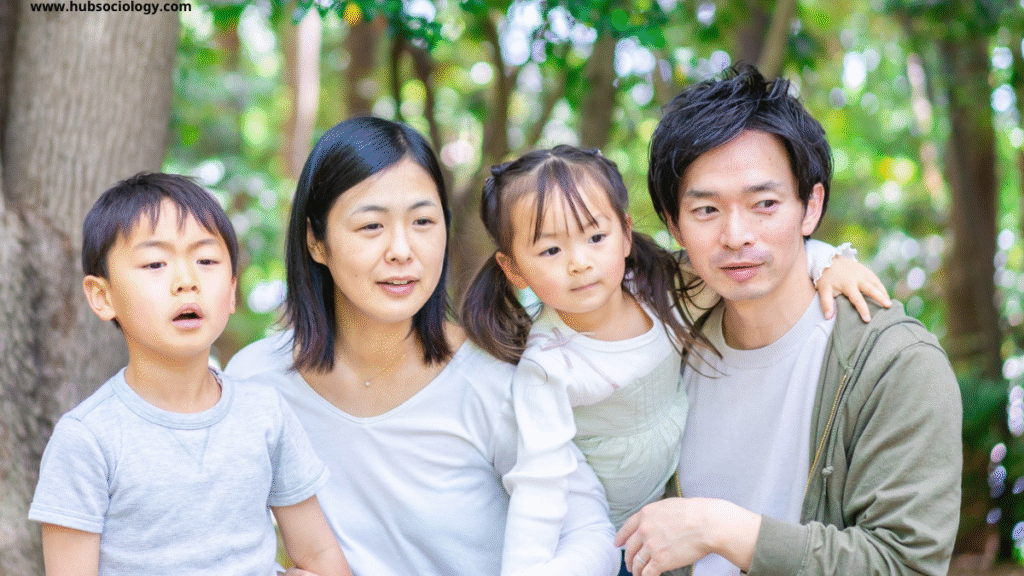Introduction of Family in Sociology
The family in sociology is one of the most fundamental social institutions, playing a crucial role in the socialization of individuals and the maintenance of social order. Sociologists study the family to understand its structure, functions, and evolving roles in different societies. Over time, the concept of the family has undergone significant transformations due to economic, cultural, and political changes. This article explores the types of families, their functions, and the changing roles within the family from a sociological perspective.
Table of Contents
Types of Family in Sociology
Sociologists classify families based on their structure, authority, residence, and marriage patterns. The major types include:
1. Nuclear Family
A nuclear family is made up of a mother, father, and their offspring who reside in the same home. This type of family is common in industrialized and urban societies where mobility and economic independence are prioritized.

2. Extended Family
An extended family includes not only parents and children but also other relatives such as grandparents, uncles, aunts, and cousins living together or in close proximity. This structure is prevalent in agrarian and traditional societies where collective living provides economic and emotional support.
3. Single-Parent Family
A single-parent family is headed by one parent, either a mother or a father, due to divorce, separation, death, or personal choice. This type of family has become more common in modern societies, often facing economic and social challenges.
4. Blended (Reconstituted) Family
A blended family forms when two individuals with children from previous relationships marry or cohabit. This structure involves step-parents and step-siblings, requiring adjustments in roles and relationships.
5. Childless Family
Some couples are unable to conceive or decide not to have children. These families focus on the partnership between spouses, careers, or other social engagements.
6. Same-Sex Family
With the legalization of same-sex marriages in many countries, families headed by LGBTQ+ couples (with or without children) are increasingly recognized as a legitimate family structure.

7. Patriarchal and Matriarchal Families
- Patriarchal Family: Authority is held by the eldest male member (usually the father).
- Matriarchal Family: The mother or eldest female holds primary authority (less common but found in some tribal societies).
8. Matrilocal and Patrilocal Families
- Matrilocal: The married couple lives with or near the wife’s family.
- Patrilocal: The couple resides with or near the husband’s family.
These classifications show that family structures vary across cultures and historical periods, reflecting societal norms and economic conditions.
Functions of the Family in Sociology
Sociologists, particularly functionalists, emphasize the essential roles families play in maintaining social stability. According to George Peter Murdock (1949), the family performs four universal functions:
1. Sexual Regulation
The family regulates sexual behavior by defining acceptable relationships (e.g., marriage) and prohibiting incest, thus maintaining social order.
2. Reproduction
Families ensure the continuation of society by producing and raising children.
3. Socialization
The primary socialization agent that teaches children cultural customs, norms, and values is the family.
4. Economic Cooperation
Families provide financial support, distribute resources, and fulfill material needs.
Additional Functions (According to Talcott Parsons)
- Primary Socialization: Teaching kids the fundamentals of behavior and social conventions.
- Stabilization of Adult Personalities: Emotional support for adults through marital relationships.
However, critics argue that these functions are idealized and do not account for dysfunctional families or alternative structures.
Changing Roles in the Family in Sociology
The family is not a static institution; its roles and dynamics have evolved due to industrialization, feminism, legal reforms, and economic shifts. Key changes include:
1. Decline of the Extended Family
Industrialization and urbanization have led to the rise of nuclear families as people move for employment, reducing dependence on extended kin.
2. Changing Gender Roles
Traditional gender roles, where men were breadwinners and women homemakers, have shifted. Feminist movements and economic necessities have encouraged more women to enter the workforce, leading to dual-earner households.
3. Rise in Divorce and Single-Parent Families
Increased divorce rates (due to legal reforms, financial independence of women, and changing attitudes toward marriage) have led to more single-parent families.
4. Delayed Marriage and Childbearing
Many individuals now prioritize education and careers, leading to later marriages and fewer children. Some opt for cohabitation instead of formal marriage.
5. Recognition of Diverse Family Forms
Traditional notions of family are being challenged by the growing societal and legal acceptance of same-sex marriages, blended families, and chosen families (non-blood ties).
6. Economic Pressures and Dual-Income Families
Rising living costs require both partners to work, altering domestic responsibilities and childcare arrangements.
7. Technology and Family Dynamics
Digital communication has changed family interactions, with both positive (staying connected) and negative (reduced face-to-face interaction) effects.
Theoretical Perspectives on Family in Sociology
Different sociological theories offer varying interpretations of the family:

1. Functionalism
- Views the family as a stabilizing institution that fulfills essential societal needs.
- Emphasizes roles like socialization, economic support, and emotional security.
2. Conflict Theory
- Argues that the family perpetuates social inequalities (e.g., patriarchy, wealth disparities).
- Feminist perspectives highlight gender oppression within traditional family structures.
3. Symbolic Interactionism
- Focuses on how family members create meaning through interactions.
- Examines changing perceptions of marriage, parenting, and gender roles.
4. Postmodernism
- Suggests that family structures are increasingly diverse and fluid.
- Highlights the decline of traditional norms and the rise of individualized family arrangements.
Conclusion on Family in Sociology
The family remains a central institution in sociology, but its forms and functions continue to evolve. While traditional nuclear and extended families were once the norm, modern societies now embrace diverse family structures, including single-parent, blended, and same-sex families. Economic, cultural, and legal changes have reshaped gender roles, marriage patterns, and child-rearing practices.
Sociological theories provide different lenses to analyze these transformations—functionalism emphasizes stability, conflict theory critiques inequality, and symbolic interactionism explores interpersonal dynamics. As societies progress, the concept of family will likely continue to adapt, reflecting broader social, economic, and technological trends.
Understanding these changes helps policymakers, educators, and social workers address challenges such as childcare, domestic violence, and economic support for evolving family structures. Ultimately, the family, in all its forms, remains a vital unit of socialization and emotional bonding in society.
Do you like this this Article ? You Can follow as on :-
Facebook – https://www.facebook.com/hubsociology
Whatsapp Channel – https://whatsapp.com/channel/0029Vb6D8vGKWEKpJpu5QP0O
Gmail – hubsociology@gmail.com
Topic related questions on Family in Sociology
1. Conceptual and Theoretical Questions on Family in Sociology
- How do sociologists define the family as a social institution?
- What are the major differences between nuclear and extended families?
- How does functionalism explain the role of the family in society?
- According to conflict theory, how does the family perpetuate social inequalities?
- How does symbolic interactionism analyze family dynamics?
2. Types of Family in Sociology
- What are the main types of family structures in sociology?
- How have industrialization and urbanization influenced the shift from extended to nuclear families?
- What social and legal factors have contributed to the rise of single-parent families?
- How do same-sex families challenge traditional definitions of family?
- What are the differences between patriarchal and matriarchal family systems?
3. Functions of the Family in Sociology
- What are the four universal functions of the family according to George Murdock?
- How does the family contribute to the socialization process?
- Why is economic cooperation considered an essential function of the family?
- How have modern families adapted to changing economic demands?
- In what ways has the family’s role in sexual regulation evolved over time?
4. Changing Roles and Trends in the Family in Sociology
- How have gender roles within the family changed in modern societies?
- What factors have contributed to the increase in divorce rates?
- How has delayed marriage and childbearing impacted family structures?
- What role does technology play in shaping contemporary family interactions?
- How do economic pressures influence dual-income families?
5. Sociological Perspectives on Family Changes
- How do functionalists view the decline of the extended family?
- From a feminist perspective, how does the family reinforce gender inequality?
- How does postmodernism explain the increasing diversity in family structures?
- What are the criticisms of the functionalist view of the family?
- How does the concept of “chosen family” challenge traditional sociological definitions?
6. Policy and Social Implications
- What challenges do single-parent families face in modern society?
- How can governments support changing family structures through policy?
- What are the social implications of the rise in cohabitation instead of marriage?
- How does the recognition of same-sex families impact societal attitudes toward marriage?
- What role do education and media play in shaping perceptions of family roles?

1 thought on “Family in Sociology: Types, Functions, and Changing Roles”